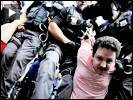
Puerto Rican college students have been waging a series of demonstrations to protest austerity measures they say endanger the higher education system. Last night, students at the University of Puerto Rico campus in Bayamón voted to begin an indefinite strike, while students at the Ponce campus voted to begin a 72-hour strike. Students at the University of Puerto Rico at Utuado have also shut down the campus. In March, students held a protest outside the Puerto Rican Treasury, known as Hacienda. Some students had a chance to meet with Juan Flores Galarza, the sub-secretary of the Puerto Rican Treasury. Democracy Now!’s Juan Carlos Dávila was there and filed this report.
Transcript
AMY GOODMAN: So, Juan, you said the hedge funds are concerned the money would go to public services on the island. Let’s talk about this, because this comes as Puerto Rican college students have been waging a series of demonstrations to protest austerity measures they say endanger the higher education system. Last night, students at the University of Puerto Rico campus at Bayamón voted to begin an indefinite strike, while students at the Ponce campus voted to begin a 72-hour strike. Students at the University of Puerto Rico campus in Utuado have also shut down the campus.
JUAN GONZÁLEZ: In March, students held a protest outside the Puerto Rican Treasury, known as Hacienda. Some students had a chance to meet with Juan Flores Galarza, the sub-secretary of the Puerto Rican Treasury. Democracy Now!’s Juan Carlos Dávila was there in Puerto Rico and filed this report.
STUDENT PROTESTER 1: [translated] The governor has always said that the people are first and the bondholders last. He should stop lying, because in May and June he needs to make two bond payments. We know that the government of Puerto Rico will pay the bondholders first, and they don’t care about the University of Puerto Rico.
CORALY LEÓN MORALES: [translated] My name is Coraly León Morales. I’m a student in social work. In December 2015, the government decided to pay the debt, which put a freeze on funding for the University of Puerto Rico’s budget. They took money from different public corporations, including the University of Puerto Rico. I’m working on my thesis right now, and the school doesn’t have enough professors to supervise students’ theses.
TANIA HERNÁNDEZ CARABALLO: [translated] My name is Tania Hernández. The university has been eliminating professors and eliminating courses and classes that we need for our professional development.
LODERAY BRACERO MARRERO: [translated] I am Loderay Bracero Marrero. The legislative scholarships that are assigned funding for graduate students have been reduced enormously. This means that graduate students have no financial support for their studies, and many might not be able to finish their doctoral and their master’s programs.
GUILLERMO GUASP: My name is Guillermo Guasp, and I’m president of the Student General Council. What they told the professors and the students, that they cannot guarantee them anymore any financial aid for them to do maybe some research or go to a conference or go to represent the University of Puerto Rico at an international background. So that really jeopardizes our role, not just here in Puerto Rico, but also to compete against other universities in the world.
STUDENT PROTESTER 2: [translated] We are organizing to keep the protests going while our colleagues are negotiating and talking inside. We are giving them one hour.
JUAN CARLOS DÁVILA: On March 18, representatives from all 11 campuses of the University of Puerto Rico met with Juan Flores Galarza, the sub-secretary of the Puerto Rican Treasury, locally known as Hacienda, to push for a dialogue in regards to the funding that belongs to the public university and the disbursement they have withheld. Flores Galarza assured that the Treasury has not stopped giving payments to the University of Puerto Rico, but that the economic crisis of Puerto Rico forces them to pay less money.
JUAN FLORES GALARZA: [translated] There’s a clause in the Constitution which needs to be invoked. That said, when the government of Puerto Rico doesn’t have sufficient resources to meet its obligations, it needs to distribute money according to priorities. And the Constitution of Puerto Rico says that the number one priority is paying for the servicing of the debt.
MELODY VÉLEZ PÉREZ: [translated] What has been created is a crisis of human rights, a crisis for the people. Our country is collapsing. With the money being allocated to the University of Puerto Rico, we cannot operate. The system is getting dismantled.
My name is Melody Vélez Pérez. The conversation that we’re trying to have is that you need to not pay the debt that we are in, because basic services, as it is education, as it’s security, as it’s health, those things have to be assured first. We can’t aspire to get out of this crisis if we don’t have a strong education system. This is where the ideas are going to come from to help our country move forward. Our country is collapsing, and we simply cannot let that happen anymore. There’s something larger at play here, and it is something that will—if we lose this, I think we are going to lose everything else in our country.
STUDENT PROTESTER 3: [translated] We can’t let them come with the excuse that there is a crisis. The crisis is not our fault. We are students, and we will defend what is fair, that everybody has access to a public education.
AMY GOODMAN: That report from Puerto Rico by Democracy Now!’s Juan Carlos Dávila. Multiple campuses of the University of Puerto Rico are currently on strike.
This is Democracy Now! When we come back, we go to Iceland, where the Panama Papers’ first casualty happened yesterday: The prime minister resigned. Stay with us.













Media Options